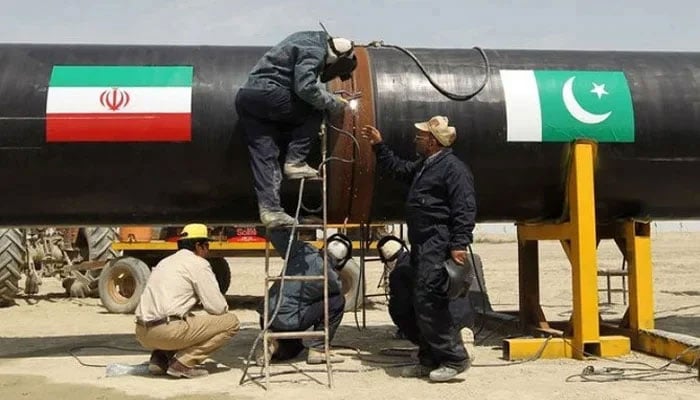Islamabad in a position to complete Pak-Iran gas pipeline: Asif
The development came amid the United States’ explicit opposition to the bilateral project
ISLAMABAD: Ahead of Iranian President Ibrahim Raisi’s visit this month, Defence Minister Khawaja Asif has said that “Pakistan is in a position to complete [gas] pipeline project with Iran, and makes decision regarding it”.
“We are constructing gas pipeline on our side from Gwadar to the Iranian border,” Asif said while speaking on Geo News’ Capital Talk programme on Monday.
Earlier this month, The News reported that Pakistan commenced the work to begin the construction of the 80km section of the Pakistan-Iran gas pipeline from Gwadar to a point where it can be connected with the Iranian section of the project.
The development came amid the United States’ explicit opposition to the bilateral project, coupled with warnings of potential sanctions, which has faced a nearly decade-long delay as it was set to be completed in December 2014 followed by its operationalisation in January 2015.
Iranian President Ibrahim Raisi is set to visit Pakistan on April 22, sources told Geo News earlier today, amid prevailing tensions in the Middle East over Iran’s unprecedented drone and missile attack on Israel.
As per the sources, Islamabad and Tehran have agreed upon the matters pertaining to President Raisi’s visit who will be accompanied by a high-level delegation and will hold meetings with Prime Minister Shehbaz Sharif, President Asif Ali Zardari, and the military leadership.
The visit is part of ongoing efforts by the two countries to deepen their cooperation which received a temporary setback earlier this year.
Pointing towards border tensions between the neighbourly countries in January, the defence minister told Capital Talk host Hamid Mir that ties between Pakistan and Iran are stable despite an incident earlier. “Progress was made on the gas pipeline project which further strengthened bilateral ties.”
Relations between the two countries had turned sour after Pakistan, in retaliation to Tehran’s cross-border strikes, carried out precision strikes using killer drones, rockets, loitering munitions and stand-off weapons to target terrorists inside Iranian territory.
Speaking about other matters, the Pakistan Muslim League-Nawaz (PML-N) senior leader termed the country’s economic stability among top priorities of the coalition government. Commenting on the political situation, he was of the view that the government would not face any political threat if his party managed to stabilise the economy in a few months.
Responding to a question, Asif also said that Pakistan has good ties with Saudi Arabia and the United Arab Emirates (UAE). In the same talk show, the defence minister condemned the Israeli attack on the Iranian consulate in Damascus that led to the killing of senior military officers. Asif categorically said that Iran has the right to retaliate as Israel attacked the former’s consulate in open violation of international laws.
He added that Pakistan was also expecting a retaliation from Iran after the Israeli attack. He expressed his views that the attack on the Iranian consulate was result of supporting Palestinians. Asif said that Pakistan is firmly standing beside the Palestinians.
He feared that rising tensions in the Middle East might affect other countries including Pakistan. Asif added that the flames of war would also engulf those countries who are backing Israel. “We do not want tensions to increase, however, genocide of Palestinians must be stopped,” urged Asif.
The sacrifices of the Palestinians will not go in vain and they will see independence soon, the defence minister said, clarifying that Pakistan was not facing any kind of pressure to recognise Israel.
-
 Is Elon Musk Set To Become First Trillionaire In 2026? Market Odds Explained
Is Elon Musk Set To Become First Trillionaire In 2026? Market Odds Explained -
 Prince Harry’s Protective Stance On Meghan Markle Sparked Rift With William, Charles
Prince Harry’s Protective Stance On Meghan Markle Sparked Rift With William, Charles -
 How BTS Push Through Performances As They Gear For 2026 Comeback
How BTS Push Through Performances As They Gear For 2026 Comeback -
 AI Copyright Battle: ByteDance To Curb Seedance 2.0 Amid Disney Lawsuit Warning
AI Copyright Battle: ByteDance To Curb Seedance 2.0 Amid Disney Lawsuit Warning -
 Savannah Guthrie In Tears As She Makes Desperate Plea To Mom's Kidnappers
Savannah Guthrie In Tears As She Makes Desperate Plea To Mom's Kidnappers -
 Canada’s Defence Industrial Strategy Targets 125,000 Jobs And Export Growth
Canada’s Defence Industrial Strategy Targets 125,000 Jobs And Export Growth -
 Tre Johnson, Former NFL Guard And Teacher, Passes Away At 54
Tre Johnson, Former NFL Guard And Teacher, Passes Away At 54 -
 Jerome Tang Calls Out Team After Embarrassing Home Defeat
Jerome Tang Calls Out Team After Embarrassing Home Defeat -
 Cynthia Erivo Addresses Bizarre Rumour About Her Relationship With Ariana Grande
Cynthia Erivo Addresses Bizarre Rumour About Her Relationship With Ariana Grande -
 Prince Harry, Meghan Markle Spotted Cosying Up At NBA All-Star Game
Prince Harry, Meghan Markle Spotted Cosying Up At NBA All-Star Game -
 Lady Gaga Explains How Fibromyalgia Lets Her 'connect With People Who Have It'
Lady Gaga Explains How Fibromyalgia Lets Her 'connect With People Who Have It' -
 Metro Detroit Weather Forecast: Is The Polar Vortex Coming Back?
Metro Detroit Weather Forecast: Is The Polar Vortex Coming Back? -
 Daniel Radcliffe Reveals Surprising Way Fatherhood Changed Him
Daniel Radcliffe Reveals Surprising Way Fatherhood Changed Him -
 ‘Disgraced’ Andrew At Risk Of Breaking Point As Epstein Scandal Continues
‘Disgraced’ Andrew At Risk Of Breaking Point As Epstein Scandal Continues -
 Alan Cumming Shares Plans With 2026 Bafta Film Awards
Alan Cumming Shares Plans With 2026 Bafta Film Awards -
 OpenClaw Founder Peter Steinberger Hired By OpenAI As AI Agent Race Heats Up
OpenClaw Founder Peter Steinberger Hired By OpenAI As AI Agent Race Heats Up




